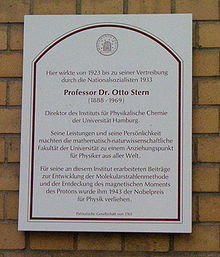- Otto Stern
-
- Otto Stern was also the penname of German women's rights activist Louise Otto-Peters (1819-1895)
Otto Stern 
Born 17 February 1888
Sohrau, Kingdom of PrussiaDied 17 August 1969 (aged 81)
Berkeley, California, USANationality Germany Fields Physics Institutions University of Rostock
University of Hamburg
Carnegie Institute of Technology
University of California, BerkeleyAlma mater University of Breslau
University of FrankfurtKnown for Stern-Gerlach experiment
Spin quantization
Molecular ray methodNotable awards Nobel Prize in Physics (1943) Otto Stern (17 February 1888 – 17 August 1969) was a German physicist and Nobel laureate in physics.
Contents
Biography
Stern was born in Sohrau, now Żory in the German Empire's Kingdom of Prussia (now in Poland) and studied at Breslau, now Wrocław in Lower Silesia.
Stern completed his studies at the University of Breslau in 1912 with a doctor's degree in physical chemistry. He then followed Albert Einstein to Charles University in Prague and in later to ETH Zurich. Stern received his Habilitation at the University of Frankfurt in 1915 and in 1921, he became a professor at the University of Rostock, which he left in 1923 to work at the newly founded Institut für Physikalische Chemie at the University of Hamburg.
After resigning from his post at the University of Hamburg in 1933 because of the Nazis' Machtergreifung (seizure of power), he became professor of physics at the Carnegie Institute of Technology and later professor emeritus at the University of California, Berkeley.
As an experimental physicist Stern contributed to the discovery of spin quantization in the Stern-Gerlach experiment with Walther Gerlach in 1922;[1][2] demonstration of the wave nature of atoms and molecules; measurement of atomic magnetic moments; discovery of the proton's magnetic moment; and development of the molecular ray method which is utilized for the technique of molecular beam epitaxy.
He was awarded the 1943 Nobel Prize in Physics, the first to be awarded since 1939. He was the sole recipient in Physics that year, and the award citation omitted mention of the Stern-Gerlach experiment, as Gerlach had remained active in Nazi-led Germany.
References
- ^ Walther Gerlach & Otto Stern, "Das magnetische Moment des Silberatoms", Zeitschrift für Physik, V9, N1, pp. 353-355 (1922).
- ^ Friedrich, Bretislav; Herschbach Dudley (December 2003). "Stern and Gerlach: How a Bad Cigar Helped Reorient Atomic Physics". Physics Today. Archived from the original on 2007-09-29. http://web.archive.org/web/20070929091315/http://www.physicstoday.org/vol-56/iss-12/p53.html. Retrieved 2007-10-07.
See also
- List of German inventors and discoverers
External links
- Otto Stern's biography at nobelprize.org
- Stern's publication on his molecular beam method
- Otto Stern School Frankfurt am Main, Germany
Nobel Laureates in Physics (1926–1950) Perrin (1926) · Compton / C. Wilson (1927) · O. Richardson (1928) · De Broglie (1929) · Raman (1930) · Heisenberg (1932) · Schrödinger / Dirac (1933) · Chadwick (1935) · Hess / C. D. Anderson (1936) · Davisson / Thomson (1937) · Fermi (1938) · Lawrence (1939) · Stern (1943) · Rabi (1944) · Pauli (1945) · Bridgman (1946) · Appleton (1947) · Blackett (1948) · Yukawa (1949) · Powell (1950)
Complete list · (1901–1925) · (1926–1950) · (1951–1975) · (1976–2000) · (2001–2025) Categories:- 1888 births
- 1969 deaths
- People from Żory
- ETH Zurich faculty
- Experimental physicists
- People from the Province of Silesia
- Nobel laureates in Physics
- German Nobel laureates
- University of California, Berkeley faculty
- Carnegie Mellon University faculty
- University of Rostock faculty
- University of Breslau alumni
Wikimedia Foundation. 2010.

